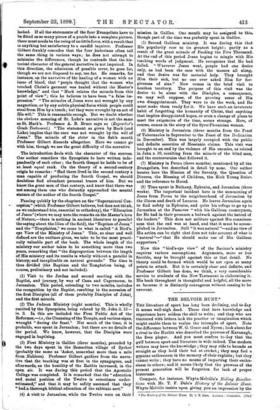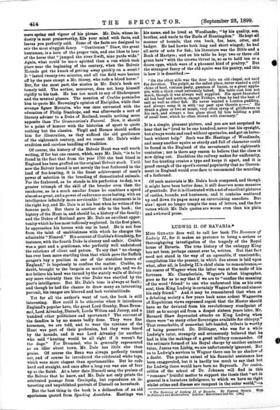THE BELVOIR HUNT.* Tun literature of sport has long been
declining, and to-day it seems well-nigh dead. Those that have knowledge and experience have seldom the skill to write; and they who are tinctured with letters lack the practice or imagination which might enable them to realise the triumphs of sport. Note the difference between W. G. Grace and Nyren ; look about for a rival to the Hazlitt who described the prowess of Kavanagh, the fives player. And you must confess to-day that the gulf between sport and literature is wide indeed. The modern writers may have the knowledge ; they may ride to hounds as straight as they hold their bat at cricket ; they may feel a genuine enthusiasm in the memory of their exploits; but they cannot write ; they have no means of imparting their enthu- siasm to others ; and it seems likely that the prowess of the present generation will be forgotten for lack of proper historians.
Compare, for instance, Whyte-Melville's. Riding Recollec- tions with Mr. T. F. Dale's History of the Belvoir Hunt. Whyte-Melville insists upon giving you an impression by the ° The History of :he Delvoir Hunt. By T. F. Dale. London ; Constable. [21a)
mere spring and vigour of his phrase. Mr. Dale, whose in- dustry is most praiseworthy, fills your mind with facts, and leaves you perfectly cold. Some of the facts are designed to stir the most sluggish fancy. " Gentleman " Shaw, the great huntsman, is a hero of the proper vein, and one likes to hear of the horse that "jumped the river Swift, nine yards wide."
Again, what could be mole spirited than a run which took place near the beginning of the century, when the Belvoir Hounds got the knack of getting away quickly on a scent ? It " lasted twenty-two minutes, and all the field were beaten off by the pace except a Mr. Storey, who rode a blood horse."
But, for the most part, the stories in Mr. Dale's book are tamely told. The author, moreover, does not keep himself
rigidly to his task. He has too much to say of Shakespeare and the musical glasses. The mention of Crabbe persuades him to quote Mr. Browning's opinion of Euripides, while that
strange figure Mattaire, who was once entrusted with the education of Philip Stanhope, and was afterwards a sort of literary adviser to a Duke of Rutland, recalls nothing more apposite than The Grammarian's Funeral. Now, it should be a point of honour with the historian of sport to quote nothing but the classics. Virgil and Horace should suffice him for illustration, as they sufficed the old gentlemen of the eighteenth century, and we resent Mr. Dale's wider erudition and careless handling of tradition.
Of course, the history of the Belvoir Hunt was well worth writing, if for but one reason, which, says Mr. Dale, "is to be found in the fact that from the year 17G0 the best blood in England has been grafted on the original Belvoir stock. Until now the Belvoir hound is not merely the best foxhound in the land of fox-hunting, it is the finest achievement of man's power of selection in the breeding of domesticated animals. For the foxhound, as he stands in his perfection to-day, is a greater triumph of the skill of the breeder even than the racehorse, as in a much smaller frame he combines a speed almost as great, and a power of endurance more lasting, with an intelligence infinitely more serviceable." That statement is in the right key, and Mr. Dale is at his best when he writes of the famous pack. But there is another side to the book ; the hiptory of the Hunt is, and should be, a history of the family; and the Dukes of Rutland gave Mr. Dale an excellent oppor- tunity which he has most tediously neglected. In the first place, he approaches his heroes with cap in hand. He is not free from the taint of snobbishness with which he charges the admirable "Nimrod." His account of Crabbe's friendship, for instance, with the fourth Duke is clumsy and unfair. Crabbe was a poet and a gentleman, who perfectly well understood the relations of client and patron. To say that " no change has ever been more startling than that which gave the Suffolk gaugers boy a position in one of the stateliest homes of England," is hopelessly to confuse the matter. Crabbe, no doubt, brought to the bargain as much as he got, and we do not believe his head was turned by the stately walls of Belvoir any more violently than the wise Duke was startled by the poet's intelligence. Bat Mr. Dale's tone is always at fault ; and though he had the chance to draw many an interesting portrait, his images are blurred and lack verisimilitude.
Yet for all the author's want of tact, the book is still interesting. How could it be otherwise when it introduces England's popular hero, the great Lord Granby, Bean Brum- mel, Lord Alvanley, Disraeli, Lords Wilton and Jersey, and a hundred other politicians and sportsmen ? The account of the dandies is by no means badly done. They were fine horsemen, we are told, and to wear the costume of the Hunt was part of their profession, but they were bored by the hounds, and it was Lord Alvanley (or another) who said " hunting would be all right if it weren't for the dogs." For Brummel, who is generally represented as an idler about town, Mr. Dale has little else than praise. Of course the Beau was always perfectly turned out, and of course he introduced the celebrated white tops, which were more elegant than sportsmanlike. But he rode hard and straight, and once after a long run was one of four up at the finish. At a later date Disraeli sang the praises of the Belvoir that he knew, and Mr. Dale not only prints the celebrated passage from Coningsby, but reproduces an in- teresting and unpublished portrait of Disraeli on horseback.
But the best thing in the book is a delineation of an old sportsman quoted from Sporting Anecdotes. Hastings was
his name, and he lived at Woodlands; " by his quality, son, brother, and uncle to the Earls of Huntingdon." He kept all manner of hounds, that run buck, fox, hare, otter, and badger. He had hawks both long and short winged; he had all sorts of nets for fish; his literature was the Bible and a Book of Martyrs ; and on his table he kept two or three old green hats " with the crowns thrust in, so as to hold ten or a dozen eggs, which were of a pheasant kind of poultry." But the strangest fancy of the old squire was his pantry, and this is how it is described :—
"On the other site was the door into an old chapel, not used for devotion. The pulpit, as the safest place, never wanted a cold chine of beef, venison pasty, gammon of bacon, or a great apple- pie, with a thick crust extremely baked. His table cost him not much, though it was always well supplied. His sport furnished all but beef and mutton, except Fridays, when he had the best of salt as well as other fish. He never wanted a London pudding, and always sung it in with my past eyes therein a—.' Ho drank a glass or two at meals, very often syrup of gillifiowers in his sack, and always a tun glass stood by him holding a pint of small beer, which he often stirred with rosemary."
It is a simple, pleasant picture, and you are not surprised to i hear that he " lived to be one hundred, never lost his eyesight, but always wrote and read without spectacles, and got on horse- back without help." Such was Mr. Hastings of Woodlands, and many another squire as sturdy and full of character could be found in the England of the seventeenth and eighteenth centuries ; nor is there any reason to believe that the class is now dying out. Doubtless the railway makes for uniformity, but fox-hunting creates a type and keeps it apart, and it is proof enough of the sport's eternal popularity that no Govern- ment in England would ever dare to recommend the muzzling of a foxhound.
Of such materials is Mr. Dale's book composed, and though it might have been better done, it still deserves some measure of gratitude. For it is illustrated with a set of excellent pictures of castles, hounds, and huntsmen, and it contains scattered up and down its pages many an entertaining anecdote. But alas sport no longer tempts the man of letters, and the few verses which Mr. Dale quotes are worse even than his plain and awkward prose.



































 Previous page
Previous page